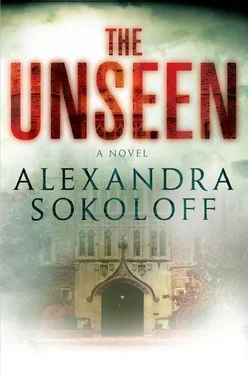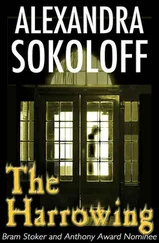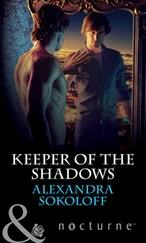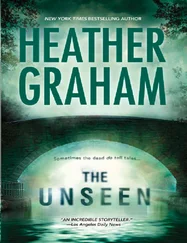Margaret didn’t offer a tour of the house, although as Laurel followed her aunt to the sitting room (or was it called a parlor?) she got glimpses of an updated cook’s kitchen, a dark-paneled study with recessed bookshelves, a screened-in porch with crisply upholstered Cape Cod furniture, and a breakfast alcove with a round table and arched windows on three sides.
Laurel paused for a moment, frowning in at the breakfast room… and felt some kind of memory stirring, just out of reach. Then she realized her aunt was stopped in the hall, waiting for her to follow, and she turned and moved after Margaret through the den.
Everything was spotless and more floral in pattern than Laurel would have expected her aunt’s taste to be, but Laurel was finding that flowery bent typical for the South.
She felt movement from the doorway behind her and turned with a start—to see a ruddy, sweet-faced man of around sixty hovering shyly behind her, in the doorway of the study. His eyes were an amazing crystal blue: Carolina blue, they called it here.
“Well, come in, Morgan—say hello.” Margaret spoke irritably, as to a child. The man blushed and dipped his head. “Morgan, you remember Laurel. Laurel, your Uncle Morgan.”
Laurel smiled at her uncle and he sidled into the room, peering at her worriedly. Laurel was starting to wonder if he could speak at all. Then suddenly he beamed at her, his whole face lighting.
“Meredith.”
For a moment Laurel thought he was in a fog of age, mistaking her for her mother. Margaret frowned and opened her mouth to speak, when Morgan shook his head.
“You look just like her,” he said softly, and Laurel felt her eyes brimming with unexpected tears.
Dinner, thankfully, commenced almost immediately, with Margaret serving from a sideboard and delegating a few trivial tasks. They sat down to the formally laid table with no grace said or even alluded to; in that, family was family.
There was no sign of a cook or any other household help, though Laurel couldn’t imagine that Aunt Margaret had made the gargantuan dinner on her own. Along with both fried chicken and steak, there were biscuits, three kinds of casseroles, and two kinds of pie, along with bottomless glasses of sweet tea. Laurel kept murmuring, “Yes, please,” to refills, even though one of the first things she’d had to learn was to order her iced tea “unsweet” to avoid the syrupy concoction that was the regional standard.
Even with the distraction of eating, Laurel was almost paralyzed with awkwardness. Every few minutes she found herself straightening her spine, anxious to sit properly. Questions about her mother were quickly floated and answered, Margaret’s work in recombinant DNA discussed, and Morgan’s reduced hours at the tobacco shop he had owned for years took mere minutes to relate, as Margaret did all the talking and clearly had no use for her brother’s shopkeeping activities. Morgan himself barely said a word beyond “please” and “thank you” throughout the entire meal, and Margaret answered any questions directed toward him for him. Laurel began to think her uncle might be simple (“simple” was the word that went through her head, instead of “autistic” or “borderline” or “schizotypal” or “developmentally disabled”). She was vaguely aware that he had lived with Margaret for some time, but had no idea if that was because he was unable to take care of himself on his own or simply that, as a lifelong bachelor and spinster, the living arrangement was more convenient and economical for both of them. But she also knew he was educated, a Duke graduate himself.
Something doesn’t fit, she thought. I wonder.
She became aware that an appalling silence had fallen around the table, and she leapt to fill it without entirely thinking.
“So I’ve been doing some research into the Rhine Laboratory.”
Margaret instantly stiffened. The air around them seemed to thicken. Morgan was industriously bent over his plate, cutting his steak, his face not visible.
Margaret touched her napkin to her lips. “What”—her tone added “on earth”—“is your interest in the Rhine Lab?”
Laurel felt as if she were walking around mines. She realized instinctively she should not mention her book. If she’d been thinking at all she would have taken the clear warning in Margaret’s tone and dropped the subject altogether, but the fact was, she didn’t know what was driving her fascination with the lab, and she had no one else to talk to about it. And somewhere in her mind, without being aware of it, she’d done the math: both Margaret and Morgan would have been at Duke in the early sixties, so surely they had anecdotal knowledge of the parapsychology lab. It had been too famous by the 1960s—the entire world had known about Rhine; as Duke students, they must have been acutely aware of the lab. She tried to keep her tone light, to diffuse the strange tension.
“I’m not sure exactly. It hadn’t even occurred to me that it was here, at Duke. I’ve heard so much about it….” She laughed slightly. “Well, it’s almost mythic, isn’t it?”
“Mythic,” Margaret repeated, tonelessly.
Laurel pressed on. “I was wondering why it was closed. So abruptly. I haven’t been able to find much about that.”
Margaret set down her glass with a thud.
“It was closed because people came to their senses. Balderdash. All of those years—all of those resources squandered on something purely unprovable. People wanting to believe and making up facts to support it. Gullible people buying into a fraud. I’m surprised you’d waste your time on something so silly.”
Her aunt was near trembling with anger. Laurel was stunned into silence. Morgan had not once raised his gaze from his plate during the entire exchange.
“I was only… curious,” Laurel stammered.
“Curiosity killed the cat.” Margaret stood, and lifted her plate. Suddenly the storm had passed and her face assembled itself into something more dignified. “If you’ll excuse me, I’ll get dessert.”
As Margaret left the room, Laurel could have cut the silence with the silver butter knife she still held limply in her hand.
Morgan had raised his head and was looking at her from across the table. “I did it,” he said quietly, conspiratorially.
Laurel looked at him, startled that he’d even spoken. She had no idea what he was confessing to.
He nodded solemnly. “I did the tests. Dr. Rhine tested me. I did it.”
Margaret’s steps clicked in the hall, approaching, and Morgan went back to mopping up gravy on his plate as if nothing had happened at all, leaving Laurel stunned speechless.
After dinner Morgan promptly disappeared for the rest of the evening, which didn’t last much longer beyond dessert. Laurel helped Margaret clear the dishes and load the dishwasher; they talked of her house purchase and of reliable plumbers and yard services, and steered far clear of the Rhine Laboratory. Morgan had retreated to the dark-paneled study; when Laurel stopped in to say good-bye he rose vaguely from a large leather armchair, book in hand, and bowed graciously. His blue eyes were so hazy Laurel had no idea if he was even aware of who she was.
At home in bed, with the still-unnamed cat purring like a diesel combine on the pillow beside her, Laurel tossed restlessly and pondered the chances that she would be related to an original Rhine test subject.
Not so entirely surprising, is it? Rhine and his researchers had conducted their experiments for thirty-eight years and had used hundreds, maybe thousands of student volunteers. Morgan had been attending the university at the time. Why wouldn’t he have participated?
She rolled over, resettled her pillow, stared up into the dark.
Читать дальше












